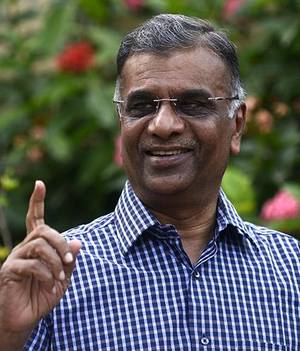Interview of P.S. Ravindran of Vajiram & Ravi Coaching, Delhi
 Ahead of the civil services preliminary exam, P.S. Ravindran, director of Vajiram and Ravi, a prominent civil services coaching centre, talks to Aloysius Xavier Lopez about the various aspects of the examination, issues and challenges.
Ahead of the civil services preliminary exam, P.S. Ravindran, director of Vajiram and Ravi, a prominent civil services coaching centre, talks to Aloysius Xavier Lopez about the various aspects of the examination, issues and challenges.
The number of candidates appearing for the civil services preliminary exam seems to have increased by around 30% in the last three years. What are the factors contributing to this trend?
Job opportunities in the private sector have shrunk significantly since the global economic meltdown in 2008. After the sixth and seventh pay commissions’ recommendations, the salaries of civil servants have also seen a visible upward trend. Further, the number of vacancies in the civil services has witnessed a sharp increase. All the above push and pull factors have contributed to the increasing popularity of civil services. Moreover civil services have always been attractive to the middle class in India, and the middle class in India is bulging. The reservation policy has also facilitated the backward classes' attraction toward civil services.
Various expert committees have been constituted to examine issues such as eligibility, syllabus, scheme and exam pattern. Yet, many issues continue to be reported in the media. What do you think has gone wrong?
Many of the expert committees' reports have not been made public. This has resulted in speculation doing the rounds in social media. There are baseless reports such as optional subjects being abolished after the 2018 examination. This makes rural students worried. There is also speculation that the age limit and the number of attempts in the civil services examination (CSE) may be reduced to 26 years and three attempts respectively. All these are anxiety-driven rumours and students should concentrate on their preparation based on the current scheme. Indian universities are keen to retain optional subjects. Otherwise, social sciences might lose their popularity among students.
Is the mushrooming of coaching centres affecting the functioning of the Union Public Service Commission (UPSC)?
The number of CS aspirants has grown manifold compared to the number of vacancies. Further, there is a huge gap between the syllabi of the graduate/post-graduate courses at the university level and the syllabus of the civil services exam. Preparation requires a different type of orientation compared to university examinations. These factors have made coaching institutions popular. Obviously, this has led to increased levels of preparation among those who attend coaching classes and consequently, increased levels of competition among candidates. For example, the cut-off marks in the preliminary and the main examination have been steadily rising. A gifted candidate with native intelligence may not pass, whereas an above average candidate with access to coaching may. However, candidates have the legal right to get coaching. The government must start more coaching institutes and provide free coaching to deserving candidates.
What are the challenges faced by persons with disabilities during the preparation for the civil services exam?
The UPSC and the Department of Personnel and Training (DoPT) have not drafted rules and regulations clearly indicating the services to which special candidates are entitled to. There is much confusion and lack of transparency. The UPSC and the DoPT must clarify this and they must be very transparent in indicating the services to which the persons with disability are eligible and the number of vacancies available.
Courtesy: The Hindu

